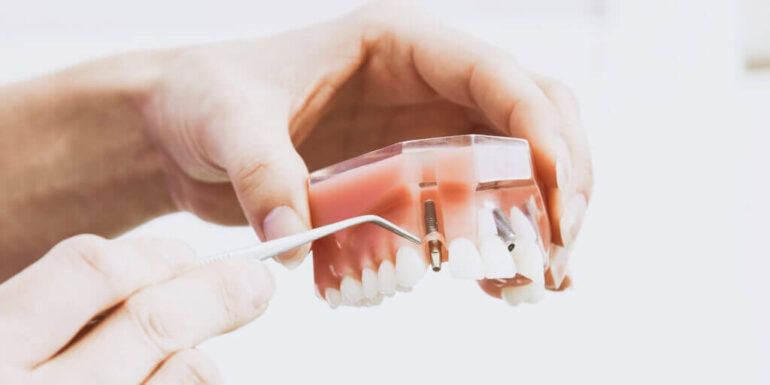So, you’ve been considering dental implants? It’s a big decision and, like any medical procedure, there are risks and complications to be aware of.
I’m here to walk you through the potential pitfalls. Grab a cup of coffee, get comfy, and let’s chat about what you need to know.
What are Dental Implants?

First off, let’s set the stage. Dental implants are essentially artificial tooth roots, typically made of titanium, that are surgically inserted into your jawbone.
They serve as a sturdy foundation for fixed or removable replacement teeth designed to blend in with your natural teeth. Sounds great, right? It is! But, it’s also important to be informed about the risks involved.
Common Risks and Complications
Surgical Risks
Like any surgery, dental implant procedures come with their own set of risks. Here are a few to keep in mind:
- Infection: Post-surgery infections can occur at the implant site. This might require antibiotics or, in severe cases, removal of the implant.
- Nerve Damage: If the implant is placed too close to a nerve, it can cause pain, numbness, or tingling in your natural teeth, gums, lips, or chin.
- Sinus Issues: For implants in the upper jaw, there’s a risk of sinus problems if the implant protrudes into one of your sinus cavities.
Healing Process and Complications
Healing is crucial for the success of dental implants. Here are a few complications that might arise during this period:
- Implant Failure: Sometimes, the bone fails to integrate with the implant, leading to its loosening. This can be due to insufficient bone density, excessive stress on the implant, or smoking.
- Bone Loss: Over time, some patients may experience bone loss around the implant, which can compromise its stability.
- Gum Recession: In some cases, the gums around the implant can recede, exposing the metal base of the implant. This not only affects the aesthetic but also increases the risk of infection.
Long-Term Risks
Even after successful surgery and healing, there are long-term risks to consider:
- Peri-Implantitis: Similar to gum disease, peri-implantitis is an infection that affects the gum and bone around an implant. It can lead to bone loss and implant failure if not treated promptly.
- Mechanical Issues: Implants can sometimes break or become loose due to various reasons, including excessive force, poor alignment, or even wear and tear over time.
Factors That Increase Risks
Certain factors can increase the likelihood of complications. It’s important to be aware of these and discuss them with your dentist:
- Smoking: Smokers have a higher risk of implant failure due to reduced blood flow to the gums, which impairs healing.
- Medical Conditions: Conditions like diabetes, osteoporosis, and autoimmune diseases can affect bone healing and increase the risk of implant failure.
- Poor Oral Hygiene: Maintaining good oral hygiene is crucial. Poor hygiene can lead to infections and peri-implantitis.
How to Minimize Risks
Choose an Experienced Dentist

One of the best ways to minimize risks is to choose a highly experienced and qualified dental professional. Do your research, ask for recommendations, and check reviews.
Follow Pre- and Post-Surgery Instructions
Your dentist will provide specific instructions before and after the surgery. Following these to the letter can significantly reduce the risk of complications. This might include things like avoiding certain foods, taking prescribed medications, and attending follow-up appointments.
Maintain Good Oral Hygiene
Brush and floss regularly and consider using an antibacterial mouthwash. Regular dental check-ups are also essential to ensure everything remains in good shape.
Healthy Lifestyle Choices
Adopting a healthy lifestyle can make a big difference. Quit smoking, limit alcohol consumption, and eat a balanced diet rich in vitamins and minerals to support bone health.
What to Do If Complications Arise

Even with the best care, complications can still occur. Here’s what to do if you suspect something’s not right:
Contact Your Dentist Immediately
Don’t wait. If you experience persistent pain, swelling, numbness, or any other unusual symptoms, reach out to your dentist as soon as possible.
Follow Professional Advice
Your dentist will provide specific instructions based on the issue. Whether it’s taking antibiotics for an infection or coming in for an adjustment, following their advice is key.
Don’t Panic
While it’s natural to feel anxious, remember that most complications can be managed effectively with prompt attention and appropriate care.
FAQs

How Painful is the Dental Implant Procedure?
The procedure is typically done under local anesthesia, so you shouldn’t feel pain during the surgery itself.
However, you may experience some discomfort, swelling, and bruising afterward. This can usually be managed with over-the-counter painkillers and should subside within a few days to a week.
How Long Do Dental Implants Last?
With proper care, dental implants can last many years, often a lifetime. However, the crowns (the visible part of the implant) might need to be replaced after 10-15 years due to normal wear and tear.
Are Dental Implants Safe?
Yes, dental implants are generally safe and have a high success rate. Complications are rare, and most issues can be managed effectively if they arise.
Choosing an experienced dental professional and following post-operative care instructions are key to ensuring a successful outcome.
Can Anyone Get Dental Implants?
Not everyone is a candidate for dental implants. Good candidates typically have healthy gums and sufficient bone density to support the implant.
Certain health conditions and habits, like uncontrolled diabetes or heavy smoking, can affect your eligibility. Your dentist will evaluate your individual situation to determine if implants are right for you.
How Much Do Dental Implants Cost?
The cost of dental implants can vary widely depending on several factors, including the number of implants needed, the complexity of the procedure, and your location.
On average, a single dental implant can cost between $3,000 and $5,000. While implants can be more expensive upfront compared to other tooth replacement options, their durability and longevity often make them a worthwhile investment.
What is the Success Rate of Dental Implants?
Dental implants have a high success rate, typically around 95%. Factors that can influence the success rate include the location of the implant in the jaw, the patient’s oral hygiene, and their overall health.
Regular dental check-ups and good oral hygiene practices can help maintain the success of dental implants.
Final Thoughts

Dental implants can be a fantastic solution for missing teeth, offering both aesthetic and functional benefits. However, like any medical procedure, it’s important to be fully aware of the risks and complications.
By choosing an experienced dentist, following their advice, and maintaining good oral hygiene, you can minimize these risks and enjoy the benefits of your new smile.
